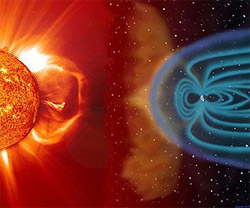Recent Stories
- Businesses urged to tap into science and technology young talent
- Digital relay baton enables remote crowd cheering of athletes
- Health Innovation Campus moves a step closer
- £7.1 million R&D boost for North West businesses
- Centre of excellence created for the next industrial revolution
- Artificial intelligence toolkit spots new child sexual abuse media online
- Strategic partnership set to help plug cyber security skills gap
- What your choice of smartphone says about you
- InfoLabTree: Discover the Story
- novi.digital Launch Event - 'An Event to Help Businesses Grow Online'
RSS Feeds
RSS feeds can deliver the latest InfoLab21 news and events direct to your browser without you having to visit the website.
In most browsers you can click on an RSS link and choose to subscribe to the feed to add it to your favourites or bookmarks.
UK Space Research Goes Online
Story supplied by LU Press Office
 The Earth bathes in the solar wind (credit: NASA)
The Earth bathes in the solar wind (credit: NASA)
Members of the public will get the chance to question the world's leading space scientists with the launch this month of an interactive website set up by Lancaster University.
The site is the idea of Dr Jim Wild of the Department of Communication Systems at InfoLab21 who wants to showcase the UK's record of world class space research.
The www.sunearthplan.net website is aimed at people interested in finding out more about research into the solar system. Anyone will be able to post questions on the website for scientists to answer.
Dr Wild said: "Whether using satellites to study the heart of the sun or the sizzling radiation found in Saturn's magnetic field or ground-based cameras and radars to probe the northern lights high over the arctic circle, UK scientists are at the forefront of solar, solar-terrestrial and solar planetary science. The www.sunearthplan.net website will showcase this exciting science and provide a forum for visitors to question the scientists directly."
The launch is timed to coincide with the launch of the UN's International Heliophysical Year, when scientists and engineers from all 191 member states take part in an international campaign to promote the space and earth sciences.
Dr Wild said: "The UK has an enviable record in space research and a significant number of UK scientists work on programmes operated by NASA, the European Space Agency and the Chinese National Space Administration. Lancaster University has a strong record of being a part of this and I wanted to showcase what we do here in the UK.
"It's important because space research leads to developments which affect us all like nuclear fusion from understanding the power source of the Sun. There are even plans to send astronauts back to the moon and to Mars but we need to understand much more about space if we are to do that successfully."
The website project is funded by the Particle Physics and Astronomy Research Council. Other organisations contributing to the website include the British Antarctic Survey, Imperial College and University College, London, and the universities of Leicester, Bath, Southampton, Sheffield and Aberystwyth.
Wed 21 February 2007
Associated Links
- Space Plasma Environment And Radio Science (SPEARS) Group - combining research of the Earth's space environment, through observations of high-latitude phenomena, with innovative design and operation of ground-based space research facilities
- Sun Earth Plan - celebrating Britain's pivotal role in space science



